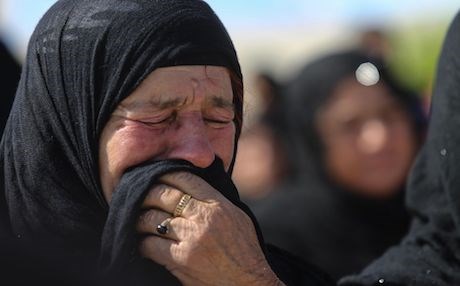ERBIL, Kurdistan Region — Kurds are remembering the Anfal campaign on its 30th anniversary when 182,000 people were massacred by the former Baathist regime in the 1980s.
In Erbil on Saturday, an 182,000-bead rosary was displayed at City Park in front of the citadel, as a gesture of tribute for the Anfal victims.
Two photography and painting exhibitions are also being showcased to convey the emotions of the Anfal survivors and victims.
April 14 marks Anfal memorial day in the Kurdistan Region, remember the deaths of 182,000 Kurds who were systematically executed by Saddam Hussein’s Baath regime. The Anfal campaign took place over eight phases — beginning in 1986, reaching its peak in 1988, and culminating in the closing weeks of the Iran-Iraq war.
Anfal, the eighth sura in the Quran, was the codename used by the Baathist regime for the slaughter.
In the city of Chamchamal in Sulaimani, another ceremony was held, where the KRG’s Martyrs and Anfal Affairs Minister Mahmood Salih Hama Karim pledged to increase services for the families of Anfal victims.
“The Anfal occasion is a huge event for our nation and homeland. Thirty years ago, the Baathist stooges directly oversaw the process which took place in eight phases,” he said. “Their [the victims] sin was that they were Kurds and had served Peshmerga in their villages… This event must remain in our thoughts.”
He added that the KRG increase assistance for Anfal survivors and their generations including tuition fees for studies, houses, ramping up efforts to help further recognize Anfal as genocide on the international level, and unearthing mass graves to bring home the Anfal victims skeletons in Iraq’s southern and central deserts.
He added they and the Iraqi government are working to transfer those wages and allowances to Baghdad’s payrolls.
The Iraqi parliament has recently issued a decree which commits the Iraqi government to pay the KRG Ministry of Martyrs and Anfal Affairs — independent of the Region’s budget share.
He added, until now, they have been capable of retrieving the corpses of only 2,500 Anfal victims.
He described the process of discovering the locations of Anfal victims as “difficult” because there are no eyewitnesses to help, and the Iraqi government, itself, is “reckless.”
Rudaw’s Hardi Mohammed in Chamchamal said Anfal victims are angry at the Iraqi government, saying elections campaigns also should have been delayed throughout to pay tribute to hundreds of thousands of victims.
Elections campaigns officially began on Saturday in Iraq. They start across the Kurdistan Region on Sunday because of the Anfal anniversary.
In Garmiyan, which saw the most tremendous barbaric Anfal campaign, a ceremony was held, with the survivors calling for those responsible behind the massacre to be tried.
A woman, who said 130 family members were exterminated during the Anfal campaign, urged the government to try the criminals of the genocide.
“Indeed our situation is good now, as they constructed house to us and pay us. But our main demand is for those who committed Anfal to be tried.”
“I mean the jash people. Swear to God, these Kurds committed Anfal. If they had not guided the Baathist, they would not have located us,” she said.
Jash is a derogatory Kurdish term that literally means a young donkey, but politically it is used for Kurdish people acting as mercenaries for the enemies of Kurdistan. The Iraqi regime last century founded all-Kurdish units for jash who fought against the Kurdish Peshmerga.
She said their only hope is to see the remains of their loved ones returned to their homeland in Kurdistan.

